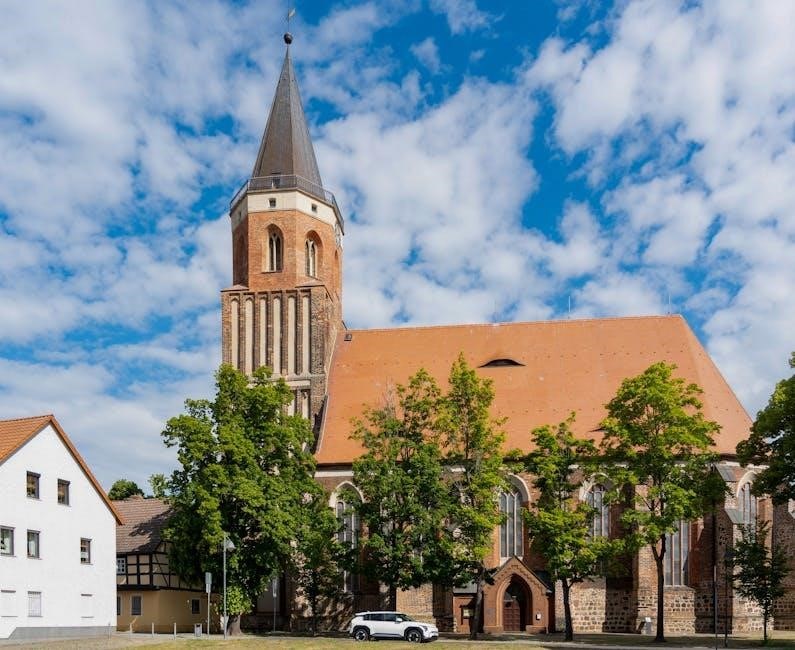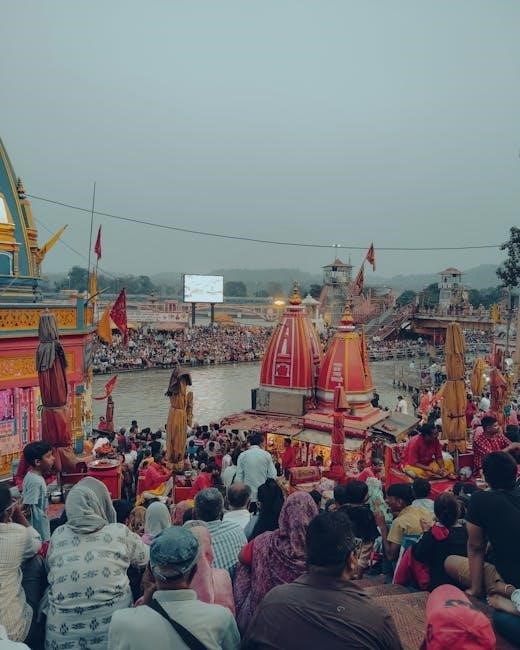The Yizkor Prayer, a solemn memorial service, honors deceased loved ones with prayers like El Malei Rachamim. Accessible as PDFs, it helps communities remember and reflect meaningfully.
1.1 Overview of the Yizkor Prayer
The Yizkor Prayer is a sacred Jewish memorial service recited to honor and remember deceased loved ones. Its central theme is the plea for God to remember the souls of the departed, ensuring their memory endures. The prayer is rooted in tradition and is typically recited during major Jewish holidays, fostering a sense of communal remembrance and spiritual connection.
1.2 Historical Significance of the Yizkor Service
The Yizkor Service traces its origins to medieval times, emerging as a response to communal tragedies. Formalized in the 16th century, it became a cornerstone of Jewish liturgy, reflecting the community’s resilience. The prayer’s evolution is documented in ancient texts like the Worms Mahzor, showcasing its enduring role in honoring the departed and preserving Jewish heritage across generations.
Structure of the Yizkor Service
The Yizkor Service includes key prayers like El Malei Rachamim and Av HaRachamim, along with memorial candle lighting, creating a structured format for honoring the departed.
2.1 Key Components of the Yizkor Liturgy
The Yizkor liturgy includes prayers like El Malei Rachamim and Av HaRachamim, memorial candle lighting, and recitation of names. These elements honor the deceased, expressing grief and seeking comfort, while fostering communal remembrance and spiritual connection.
2.2 The Role of the El Malei Rachamim Prayer
The El Malei Rachamim prayer is a heartfelt plea for God to remember the souls of the departed, offering comfort to mourners. It is central to the Yizkor service, recited to honor loved ones, and is often included in Yizkor PDFs for accessibility. This prayer emphasizes divine compassion and the eternal bond between the living and the deceased.
Accessing Yizkor Prayer PDFs
Yizkor Prayer PDFs are widely available online, offering easy access to the liturgy. They are found on synagogue websites, educational platforms, and Jewish archives, ensuring convenience for all.
3.1 Where to Find Reliable Yizkor Prayer PDFs
Reliable Yizkor Prayer PDFs can be found on synagogue websites, Jewish educational platforms, and online archives. Sites like Chabad, My Jewish Learning, and Sefaria offer authentic versions. Additionally, the Open Siddur Project provides accessible texts. These sources ensure easy access to the prayers while maintaining their traditional integrity and meaning.
3.2 Benefits of Using Digital Versions of the Prayer
Digital Yizkor Prayer PDFs offer convenience, accessibility, and portability. They can be easily downloaded and accessed on various devices, making them ideal for travelers or those without physical copies. Digital versions also enable quick searches and reference, while reducing the need for paper. Additionally, they facilitate easy sharing among community members, ensuring widespread participation in the memorial service.
The Significance of Yizkor in Jewish Tradition
Yizkor serves as a profound connection to Jewish heritage, honoring loved ones and providing comfort through prayer. It strengthens communal bonds and offers solace during times of remembrance.
4.1 Remembering Loved Ones Through Prayer
Yizkor offers a meaningful way to honor deceased loved ones through heartfelt prayer. Reciting prayers like El Malei Rachamim and Yizkor Elohim allows individuals to reflect on cherished memories and legacies. This sacred ritual provides emotional solace and strengthens spiritual connections, ensuring the memories of loved ones endure within the community and across generations.
4.2 The Emotional and Spiritual Impact of Yizkor
The Yizkor service provides emotional solace and spiritual healing for mourners. By reciting prayers like El Malei Rachamim, individuals honor their loved ones and seek comfort in shared remembrance. This sacred ritual fosters a deep sense of connection to heritage and offers a pathway to process grief, finding strength in communal support and enduring memories.

Key Prayers and Their Meanings
The Yizkor Prayer includes key prayers like El Malei Rachamim, which seeks divine compassion for the deceased. Specific prayers honor fathers and husbands, reflecting deep devotion and remembrance.
5.1 The Yizkor Elohim Prayer for a Deceased Father
The Yizkor Elohim prayer petitions God to remember the soul of a deceased father, recalling his guidance and kindness. It expresses gratitude for his legacy and seeks divine compassion. Available in PDF formats for convenience, this prayer is recited during solemn moments, fostering emotional connection and spiritual reflection on the father’s enduring influence in one’s life.
5.2 The Yizkor Elohim Prayer for a Deceased Husband
The Yizkor Elohim prayer for a deceased husband honors his memory, expressing gratitude for shared moments and seeking divine compassion. It reflects on his love and partnership, offering solace and spiritual connection. Available in PDF formats, this prayer provides emotional support and continuity, helping to maintain a lasting bond with the departed loved one through meaningful recitation.

Customs and Practices Surrounding Yizkor
Lighting memorial candles and reciting prayers like El Malei Rachamim are integral customs. These practices foster a sense of community and emotional connection during remembrance.
6.1 When and Where Yizkor is Recited
Yizkor is recited during major Jewish holidays like Yom Kippur, Shemini Atzeret, Passover, and Shavuot. It is typically recited in synagogues, though it can also be recited at home if one cannot attend. The prayer is often led by the community, emphasizing collective remembrance. Memorial candles are traditionally lit before the service to honor the departed.
6.2 The Tradition of Lighting Memorial Candles
Lighting memorial candles is a heartfelt tradition during Yizkor, symbolizing the eternal soul. Candles burn for 24 hours, representing the ongoing memory of loved ones. They are lit before Yizkor services and on anniversaries of passing, offering comfort and a connection to the departed. This practice underscores the enduring bond between the living and the deceased.
The Role of Yizkor in the Mourning Process
Yizkor provides solace in grief by connecting mourners with loved ones through prayer, fostering reflection and healing. Its recitation during holidays and anniversaries aids emotional and spiritual recovery.
7.1 How Yizkor Helps in Grieving and Healing
Yizkor offers comfort by creating a meaningful connection to loved ones who have passed, fostering reflection and emotional healing. Reciting the prayer during designated times provides a structured way to process grief, promoting spiritual recovery and resilience. It allows mourners to honor memories while finding solace in communal support and shared traditions.
7.2 Yizkor as a Connection to Jewish Heritage
Yizkor serves as a profound link to Jewish heritage, preserving memories and traditions through its recitation. It connects individuals to their ancestors, fostering a sense of continuity and shared identity. By honoring loved ones within the framework of Jewish tradition, Yizkor strengthens cultural and spiritual ties, ensuring the legacy of the community endures across generations.

Yizkor and the Community
Yizkor fosters unity and shared memory within the Jewish community. Recited collectively, it strengthens bonds and provides comfort through communal remembrance and prayer, accessible via PDF resources.
8.1 The Communal Aspect of the Yizkor Service
The Yizkor service is deeply rooted in communal participation, fostering unity among mourners. Recited together in synagogues, it creates a shared experience of remembrance and comfort. The collective recitation of prayers like El Malei Rachamim strengthens communal bonds, emphasizing the Jewish value of supporting one another in grief. This shared ritual provides solace and reinforces the connection to both the deceased and the community.
8.2 The Importance of Reciting Yizkor in Synagogue
Reciting Yizkor in synagogue is a vital tradition, emphasizing communal support and shared remembrance. The presence of a minyan (quorum) enhances the prayer’s significance, fostering a collective connection to the deceased. The synagogue setting provides a sacred space for mourners to find comfort and solace, strengthening their spiritual experience and reinforcing the bond within the Jewish community.

Educational Resources for Understanding Yizkor
Educational resources for understanding Yizkor include PDF guides, study materials, and online courses, providing comprehensive insights into the prayer’s meaning and significance in Jewish tradition.
9.1 Recommended PDF Guides and Study Materials
Recommended PDF guides and study materials on Yizkor provide detailed insights into its structure, meaning, and traditions. These resources often include translations, commentary, and historical context, enabling deeper understanding. Many guides also offer practical advice for reciting the prayer and observing related customs. They are widely available online, making them accessible for personal study and communal use.
9.2 Online Courses and Tutorials on Yizkor
Online courses and tutorials on Yizkor offer in-depth exploration of the prayer’s significance and recitation. Platforms like My Jewish Learning and Rabbi-led webinars provide video lessons, interactive modules, and downloadable PDF guides. These resources cover the prayer’s structure, historical context, and emotional impact, making them accessible for both individual and communal learning. They are ideal for those seeking a deeper understanding of Yizkor traditions and practices.

Personal Reflections and Insights
The Yizkor Prayer invites individuals to reflect on memories of loved ones, fostering emotional connection and spiritual healing through its meaningful recitation and personal significance, deeply rooted in Jewish heritage.
10.1 How Individuals Can Deepen Their Yizkor Experience
Individuals can deepen their Yizkor experience by reflecting on personal memories, preparing thoughts before recitation, and studying the prayer’s meaning. Using Yizkor prayer PDFs, they can explore traditions and connect emotionally, fostering a meaningful and heartfelt observance.
10.2 Sharing Personal Stories and Memories
Sharing personal stories and memories during Yizkor connects individuals to their heritage and loved ones. By recounting experiences, participants honor the deceased, fostering emotional bonds and communal healing. Yizkor prayer PDFs often include spaces for reflection, encouraging individuals to share anecdotes and preserve legacies, ensuring memories endure for future generations.
Cultural Variations in Yizkor Practices
Cultural variations in Yizkor practices reflect diverse traditions among Jewish communities. Ashkenazi and Sephardi customs differ in prayers, melodies, and rituals, enriching the memorial service’s universal significance.
11.1 Differences in Ashkenazi and Sephardi Traditions
The Ashkenazi tradition incorporates specific Yizkor prayers for deceased fathers and husbands, such as Yizkor Elohim. Sephardi customs include unique liturgical elements while maintaining the core purpose of honoring the deceased. Both traditions emphasize communal remembrance and the recitation of memorial prayers, reflecting shared values despite variations in expression.
11.2 Unique Customs from Various Jewish Communities
Diverse Jewish communities enrich Yizkor with unique customs. Some recite additional prayers or songs, while others incorporate poetic reflections. For instance, Grajewo’s tradition includes a poignant El Malei Rachamim, and EŝŁewen adds Yizkor Elohim with specific references to martyrs. These variations reflect cultural heritage while preserving the prayer’s core purpose of honoring the deceased and their memories.

The Future of Yizkor in the Digital Age
The digital age enhances Yizkor’s accessibility through PDFs, preserving traditions while innovating delivery. Technology ensures these prayers remain relevant, connecting future generations to their heritage seamlessly.
12;1 The Role of Technology in Preserving Yizkor Traditions
Technology plays a vital role in preserving Yizkor traditions by making prayer PDFs widely accessible. Digital platforms ensure these sacred texts reach global communities, fostering engagement and continuity. Innovations like searchable databases and interactive guides enhance learning, while maintaining the prayer’s emotional and spiritual depth. This balance of tradition and modernity ensures Yizkor remains relevant for future generations.
12.2 Innovations in Yizkor Prayer Resources
Modern innovations in Yizkor prayer resources include digital libraries offering downloadable PDFs, interactive guides, and multimedia enhancements. These tools provide easier access to sacred texts, enabling deeper engagement. Features like searchable databases and customizable prayer books cater to diverse needs, ensuring the tradition remains accessible and meaningful for contemporary practitioners while preserving its spiritual essence.
The Yizkor Prayer stands as a timeless tradition, bridging memory and spirituality. Its digital evolution ensures accessibility, preserving its legacy for future generations to honor and reflect.
13.1 The Enduring Legacy of the Yizkor Prayer
The Yizkor Prayer’s enduring legacy lies in its ability to connect generations through remembrance and spiritual reflection. Its availability in PDF formats ensures accessibility, preserving its traditions and emotional depth. By honoring loved ones, it bridges the past and present, offering comfort and a profound sense of continuity in Jewish heritage.
13.2 Final Thoughts on the Significance of Yizkor
The Yizkor Prayer holds profound significance as a bridge between memory and comfort. Its availability in PDFs ensures accessibility, preserving its role in Jewish tradition. By honoring loved ones, it fosters a sense of continuity and connection to heritage, offering solace during grief and reinforcing the importance of remembrance in sustaining communal and personal identity across generations.



Be the first to reply